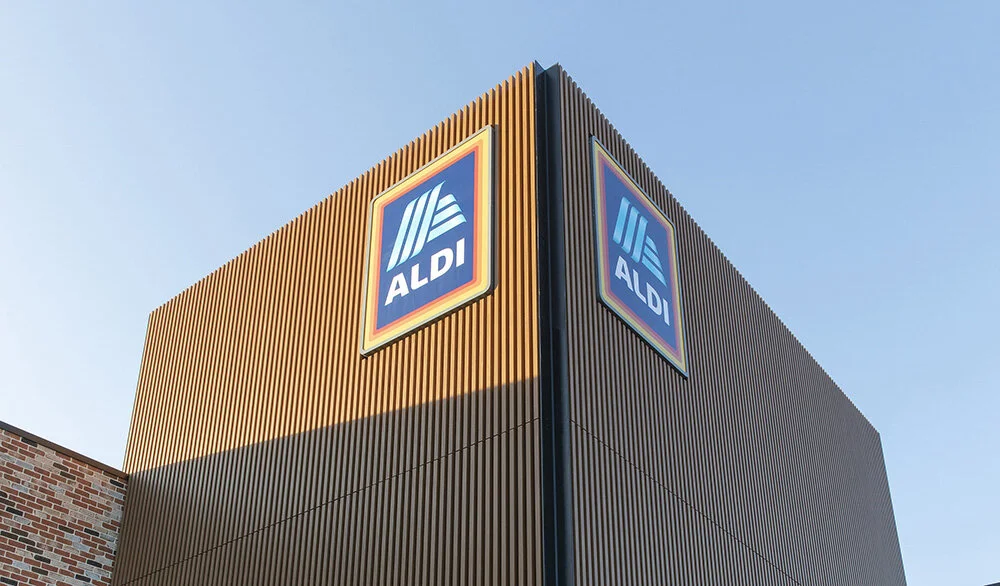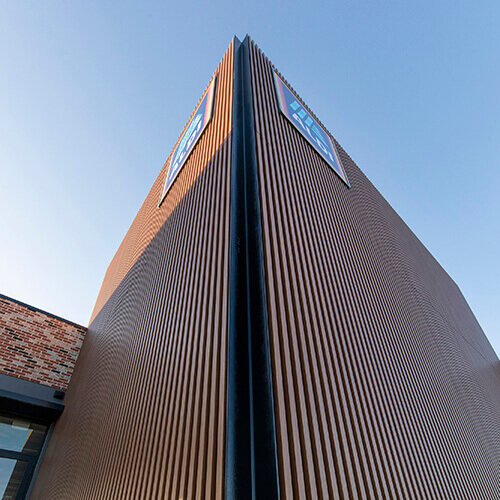Known for its high quality products and exceptional value, ALDI has quickly become a huge success story in Australia, with more than 500 stores nation-wide since its launch in 2001. As a result, ALDI’s branding, logos and stores have also become instantly recognisable to most Australians, with every store following a similar layout, design and aesthetic. However – not every ALDI store is identical; particularly those built in unique locations.
As one of the oldest local councils in Australia, Norwood – an eastern suburb in Adelaide – is a quaint, leafy suburb bursting with historical significance and heritage architecture. A combination of its proximity to Adelaide’s centre, excellent restaurants and cafes as well as beautiful heritage buildings, have helped Norwood to become one of the most sought-after suburbs in South Australia. So, when ALDI decided to build one of its newest stores in the neighbourhood, it was clear that the design would need to be very different to the usual ALDI formula.
The Challenge
Paul Clohesy, Senior Architect at Select, is an ALDI expert, having designed more than 12 ALDI stores over the past four years. “Most ALDI stores will look the same; but we knew that Norwood needed to be different”, Clohesy explains. “We went through an extensive design review and approval process with the Office for Design and Architecture South Australia (ODASA), who helped us to ensure the final look of the building would blend well with its surroundings”.
The final approved design for ALDI Norwood included replacing ALDI’s instantly recognisable pre-cast concrete box façade with brick and timber-look cladding, to soften its street presence and add character. But finding the best possible timber-look cladding was key to the unique design. “We’d already created a similar look for a previous ALDI store in a heritage area” reveals Clohesy, “But the timber-look cladding we used was a disaster. It was made from a recycled plastic and not only did longevity prove to become an issue, but the installation was extremely difficult and the product simply didn’t allow for any imperfections in the precast behind it, or thermal contraction and expansion. We ended up having to replace the entire façade, so were determined not to make the same mistake again”.
The Solution
After extensive research, Clohesy and his team selected Covet’s Ever Art Wood® 50x100 battens, in a warm, natural timber tone called ‘Riigaru Oku’, which wrapped around the ALDI ‘tower’ and signage. “This was the first time we’d ever used Covet products and the Ever Art Wood® is a lot more expensive than the other options we came across”, reveals Clohesy; “but it is also, by far, the best. There’s a long list of reasons that we ended up choosing the Covet battens, but the key ones are longevity – which was obviously vital – low-maintenance and its concealed fix system, which enabled us to achieve a perfectly flat and smooth surface”.
Clohesy continues, “Finally, there’s just the sheer quality of the finish. I'm not sure exactly how they do it, but it’s remarkable just how realistic the timber-effect of the battens is, even up close. We’re very happy with the final look – the installer was happy and the client was happy, so it really was the absolute best choice”.
Project Story
Want to see the real thing?
Location
Aldi Norwood Store
76 Magill Rd,
Norwood SA
Cladding profile
Ever Art Wood®
Fire rating
Ever Art Wood® Aluminium 50x100 Mizotsuki batten & bolt fix system
Riigaru Oku
Performs well when tested to AS/NZ 1530.3 (spread of flame / index 0) and AS/NZ 3837-1998 (result / Group 1)









